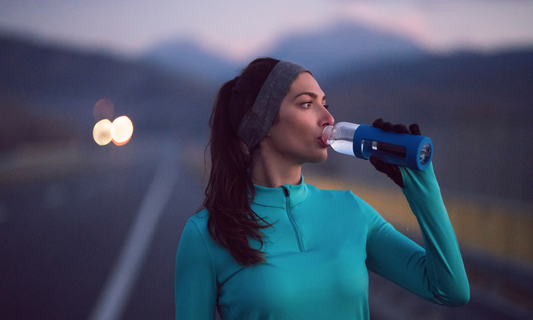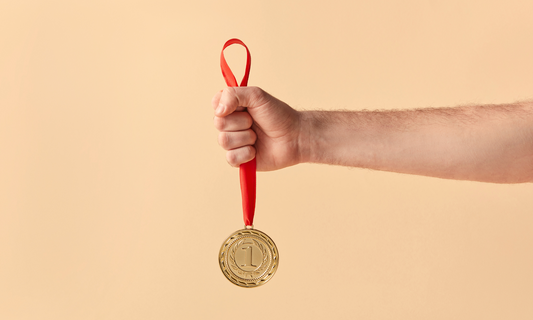How to hydrate during a race?

Running is a demanding physical activity that puts intense demands on the body. Proper hydration is crucial and requires special attention both before , during , and after exercise. When you run, your body sweats to regulate its temperature. This sweating leads to a loss of water and electrolytes, especially sodium and potassium, which are crucial for maintaining muscle and nerve function. Adequate hydration helps replace these losses, thus preventing dehydration and its harmful effects such as muscle fatigue , cramps , and decreased performance . It is therefore important to start your run well hydrated.
Hydration according to the type of race
Hydration is a crucial aspect to consider during any race, but it varies depending on the type of event you are undertaking.
Adapt your hydration for different races

1. Jogging
A run , often short and low-intensity, may seem like it requires less attention when it comes to hydration. However, it's still vital to hydrate before you head out. If you're running in hot weather or are prone to heavy sweating, consider carrying a small water bottle or a hydrating solution like Hydratis to prevent dehydration.
2. Half Marathon
The half marathon poses a greater hydration challenge due to its extended duration. It is crucial to start proactively hydrating in the days leading up to the event by increasing your fluid intake. Start with proactive hydration in the days leading up to the event by increasing your fluid intake.
3. Marathon
For a marathon , it is also essential to start well hydrated and maintain this hydration throughout the race. Drinking 400 to 600 ml of water in the hours leading up to the event is recommended. During the race, aim to drink about 1/4 liter every 20 minutes . As the duration of the effort is longer, it is wiser to drink more to avoid dehydration and optimize your performance .
By following these recommendations, you can maximize your performance and enjoyment during the race while minimizing the risk of dehydration and associated complications.
Know your body for optimal hydration
Indeed, for optimal hydration, it's also important to know your own body. The amount of hydration needed can vary depending on individual factors such as your sweat rate, weather conditions, and your level of heat acclimatization.
It's recommended that you test your hydration strategy during your workouts to find the right balance that works best for you. This may include the ideal time to drink, how much to drink, and the type of fluid that helps you perform at your best .
By understanding and respecting your body's specific needs, you will be able to reach your full potential during every race.
Choosing the right drink and the right equipment
The choice of drink
You should know that choosing the right drink is a crucial step. And water is perfect for short distances, but for prolonged efforts, Hydratis is ideal because it contains the right balance of minerals and trace elements as well as a slight concentration of carbohydrates , providing optimal hydration and energy. With Hydratis , you will have a more efficient assimilation of liquids by your body.

The addition of salt (sodium) in the Hydratis solution helps replace electrolytes lost during exercise and prevent dehydration . Sodium helps maintain the body's water balance and prevent hyponatremia, a condition caused by low sodium levels. It also promotes water absorption and retention, which is crucial for maintaining adequate hydration during long periods of physical activity. Hydratis works by balancing the osmotic balance between the water we drink and the blood in our bodies. As a result, we can hydrate better than with water alone!
Choosing Hydration Equipment
Choosing the right hydration gear is just as important as choosing the right drink for long distances. A hydration vest or backpack specifically designed for running can be an excellent choice. These pieces of equipment are designed to comfortably carry water or sports drinks, while allowing easy and quick access during the race.
Choose lightweight , comfortable gear with easy-access pockets for your water bottles or hydration bladders. Make sure the gear fits your body well and doesn't cause irritation while running.

By combining a drink that's tailored to your needs with well-chosen hydration equipment, you'll optimize your comfort and performance throughout your race.
Tips for optimal hydration
However, effective hydration is not just about what you drink, but also how and when you drink.
Some practical tips and mistakes to avoid
1) Start hydrated : Drink regularly in the days leading up to your race. Avoid diuretic drinks like excessive coffee, which can contribute to dehydration.
2) Avoid drinking too much just before running : Drinking large amounts of water immediately before running can cause gastrointestinal discomfort. It is best to drink gradually before running.
3) Don't wait until you're thirsty to drink : Thirst is a delayed indicator of dehydration. Drink at regular intervals, adjusting according to the intensity of your exercise and weather conditions.
4) Beware of excess water : Drinking too much water without electrolytes can lead to hyponatremia, a dangerous dilution of salts in the body. Proper hydration isn't just about drinking enough, but drinking wisely.
By incorporating these practices into your training routine, you'll be better prepared to manage hydration during your runs, whether it's a casual jog or a demanding marathon.
The impact of water on the body
Body temperature regulation
When you run, your body generates heat. Adequate hydration helps regulate body temperature by allowing efficient sweating, which is the body's natural cooling mechanism. Dehydration can reduce this ability, increasing the risk of overheating and heatstroke, especially in hot and humid conditions.
Muscle function
Water also plays a vital role in muscle function . Drinking water allows for better blood circulation, ensuring a constant supply of oxygen and nutrients to the muscles. This helps maintain endurance and prevent muscle fatigue . Additionally, proper hydration helps quickly flush out metabolic waste like lactic acid, reducing muscle soreness and cramps during and after running.
The consequences of dehydration
Even mild dehydration can lead to decreased performance . It increases the risk of conditions such as low blood pressure, dizziness, and exhaustion . In addition, inadequate hydration over long periods can have more serious consequences for kidney and cardiovascular health.
It's safe to say that a well-planned hydration strategy is essential for any runner, regardless of their level or distance. Effective hydration, therefore, means improved performance. By paying attention to your fluid needs and choosing the right hydration solutions, you can not only prevent the risks associated with dehydration, but also take your running performance to new levels. Hydratis products are designed to support every runner in this quest for excellence, providing the tools needed to stay hydrated, energized, and ready to take on any challenge!
Bibliography
Pub Med. March 2019. “Fluid Needs for Training, Competition, and Recovery in Track-and-Field Athletes.” Retrieved from: https://pubmed.ncbi.nlm.nih.gov/30943836/
Pub Med. March 2022. “Personalized Hydration Requirements of Runners.” Retrieved from: https://pubmed.ncbi.nlm.nih.gov/36040319/
Pub Med. November 2012. “Hydration for recreational sport and physical activity.” Retrieved from: https://pubmed.ncbi.nlm.nih.gov/23121349/
Pub Med. January 1996. “American College of Sports Medicine position stand. Exercise and fluid replacement.” Retrieved from: https://pubmed.ncbi.nlm.nih.gov/9303999/











